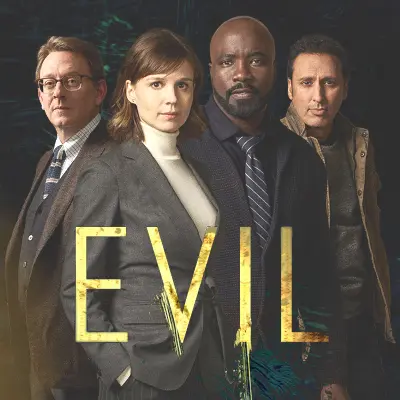CBS' Evil is a bold step back into the horror genre
-

Mike Colter and Katja Herbers have the creepy-crawliest debut episode on the CBS horror series since the glory days of Mulder and Scully, says Dave Nemetz. "The smart, penetrating writing from The Good Wife creators Robert and Michelle King takes an unflinching look at the nature of evil and deftly probes the tension between faith and science," says Nemetz. "There are still some unfortunate remnants of the CBS procedural formula here: The pilot spins an involving yarn, only to rush through it and wrap it up in too tidy a fashion. (Based on the descriptions of the first four episodes, Evil will be a case-of-the-week show, with just a few serialized elements.) But the foundation is strong, and I’m interested to see where Herbers takes this complex character of hers. Mulder and Scully might not be coming back to primetime anytime soon… but Evil's dynamic duo might be the next best thing."
ALSO:
- Evil is smart, scary and philosophical: "Evil never feels unfocused," says Jen Chaney. "It shifts between tones easily and authoritatively. Some series take a while to find their footing and rhythm. Based on the first four episodes, Evil is immediately confident in its multifaceted identity and interest in raising ideological questions, giving it a depth too often lacking in broadcast television. With its science versus faith premise, Evil is really an exploration of what constitutes good and bad behavior and why some people are rewarded and some are not. Even though it’s a wildly different show, on that point, it shares a lot in common with another Thursday night series: NBC’s The Good Place."
- It's when Evil lives up to its name that it’s most interesting: Robert and Michelle King's The Good Wife "took its time revealing that it wanted to be about more than that week’s civil proceeding," says Alan Sepinwall. "The early Evil cases are solid but not thrilling. (The closest the show comes is in its extremely dark fourth episode, about a troubled young boy who keeps trying to kill his siblings and parents, but the story doesn’t do a good enough job of explaining why the kid doesn’t get institutionalized.) The nods at something more serialized are when the show seems at its liveliest, so hopefully Evil dives deeper into those murky waters, and soon."
- Evil shows an unusual degree of polish and promise, as well as an edge that startles while existing for something other than mere shock value
- Evil is a show smart enough to know that asking the question “Are demons real?” is barely sustainable over a single episode, much less an entire broadcast TV run
- Evil is a better-than-average network procedural, but it's not better than Kings' The Good Wife
- Mike Colter on going from Marvel's Luke Cage to Evil: "Trying to ground a superhero with powers and make him a relatable character was difficult, but I enjoyed the challenge," he says. "Now we’re dealing with a world that’s really in the real world, and we’re dealing with psychology — but then there are these nuances that are odes to the supernatural and myths."
- Evil came from the conversations Robert and Michelle King have had for 30 years over the nature of evil: "Robert’s more religious, so he typically goes toward a divine explanation," says Michelle King. “I am more secular, so I tend to think things are the result of psychology or science.”
TOPICS: Evil, CBS, Katja Herbers, Michelle King, Mike Colter, Robert King
